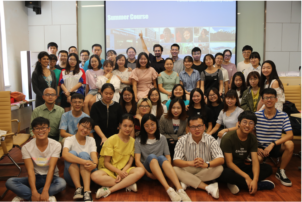
By EnvJustice, ICTA-UAB
Invited by the Northwest Agriculture and Forestry University (NWAFU), three researchers from the EnvJustice Project, Juan Liu, Arnim Scheidel and Grettel Navas, carried out a summer course entitled “Critical Social Studies: Current Issues in Sustainability Science” in Yangling, Shaanxi province of China during August 2018.
The course introduced concepts from Ecological Economics and Political Ecology to students in order to discuss sustainability challenges in China and beyond. Specific issues such as agrarian transformations, land grabbing, food systems, environmental health and ecological distribution conflicts were addressed in depth over the nine course days. Emerging alternatives such as agroecology were also presented. These topics have been extremely fresh and new to students from different parts of China.
35 undergraduate students from social sciences registered and fully participated in all the activities and the final assignments. 12 students from diverse backgrounds also audited the course. The summer course aimed to foster critical thinking among the students and was characterized for being highly interactive and participatory. In every session, working-groups were accompanied by student´s presentation aiming to put into practice the core concepts learned in each lecture.
The course also included a one-day fieldtrip to visit and observe the local water supply system and different operational modes of agriculture in a close range, interviewing some farmers in the surrounding communities. Arnim Scheidel was also invited to give a public seminar entitled “Missing the forest for the trees? The role of forest carbon assessments in climate change policy”.
The course and the related activities were made possible thanks to funding by the “High-Quality Teaching” project at NWAFU. The teaching and research activities and the fruitful discussions with students and university staff have turned the visit into a rich and fruitful academic exchange.

The project ENVJUSTICE has received funding from the European Research Council (ERC) under the European Union’s Horizon 2020 research and innovation programme (grant agreement No. 695446)